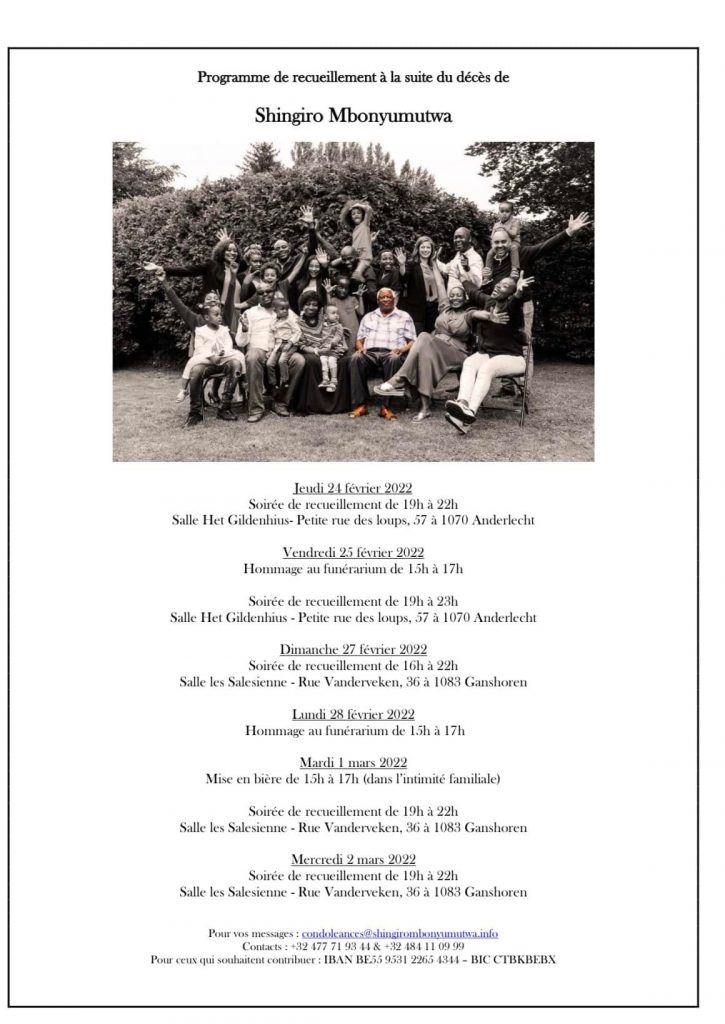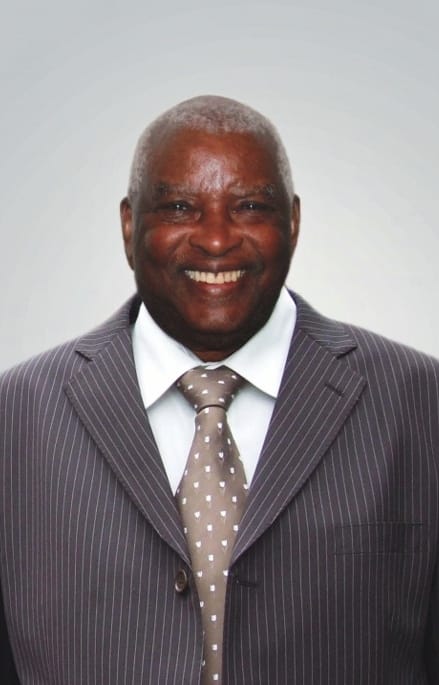By Marc Matabaro
Shingiro Mbonyumutwa will be laid to rest in Belgium this Friday, March 4, 2022, according to information provided by his family.
The church service to bid a final farewell to the deceased will be held at the Basilique Nationale du Sacré Coeur which is located in Brussels, in the commune of Koekelberg. The burial will take place at the Cemetery of Chants d’oiseaux in the commune of Anderlecht, in Brussels.
Shingiro Mbonyumutwa died of natural causes on Tuesday, February 22, 2022 at the Molière Longchamp Hospital in Brussels.
 Who is Shingiro Mbonyumutwa?
Who is Shingiro Mbonyumutwa?
- Family, education, professional life
Shingiro Monyumutwa was born on February 27, 1942 in Kamonyi- Taba in Rwanda and died on February 22, 2022 at the Molière Longchamp Hospital in Forest-Brussels. He was the eldest son of Dominique Mbonyumutwa, the first president of Rwanda, and Sophia Nyirabuhake.
He is the husband of Dorothée Uwimbabazi whom he married on September 8, 1973 in Kabgayi. Together, they had six children: Maryse Mukangabo Mbonyumutwa(1974); Patrice Rudatinya Mbonyumutwa(1975); Jean-Claude Semucyo Mbonyumutwa (1976); Gustave Mutware Mbonyumutwa (1977); Mugabe Mbonyumutwa (1984); and Ruhumuza Mbonyumutwa (1985).
Shingiro Mbonyumutwa completed his primary schooling in Kabgayi. From 1957 to 1964 he undertook his secondary studies, which began at the Collège Saint-André in Kigali and were completed at the Groupe Scolaire in Butare.
From 1964 to 1971, he undertook his tertiary studies in Geology at the University of Montpelier in France, and Sociology of Work at the Université Libre de Bruxelles in Belgium.
In 1971, he returned to Rwanda, where he worked in public administration until 1973, whereafter he was appointed Minister of Planning.
From 1976 to 1980 he worked for SOMIRWA (Société Minière du Rwanda).
From 1980 to 1983 he worked in Gisenyi as an expert appointed by the United Nations, before exiting the workforce to continue his postgraduate studies in Belgium.
He returned to Rwanda in 1987 to start his own business.
- Association and political life:
He was president of the Rwandan students’ association in France from 1964 to 1969.
From 1969 to 1971 he was president of the Rwandan students’ association in Belgium.
From 1991 to July 1994, he was a member of the political bureau of the Rwandan Democratic Movement (MDR).
In 1992, he founded and chaired the ASBL DEMOPRO (Democracy for Progress), an ASBL under Rwandan law, whose objective was to promote democracy and human rights in Rwanda.
- International Justice
He arrived in Belgium on August 26, 1994, after passing through the Democratic Republic of Congo (formerly, Zaire), where he applied for asylum.
On June 17, 1999, his application for asylum was rejected by the Permanent Commission for Refugee Appeals on the grounds that there were “serious reasons to believe that he would have knowingly supported the genocide.”
Shortly after his arrival in Belgium, he was investigated by the government to ascertain whether he had participated in the genocide. These investigations proved negative (as shown in a letter written to the investigating judge, a copy of which was obtained by The Rwandan) until October 9, 1996, when the Belgian courts were relieved of the case which was then handed over to the ICTR.
In a letter dated October 14, 1997, a copy of which was obtained by The Rwandan, the ICTR confirmed that it had begun investigations into Shingiro Mbonyumutwa, but that he continued to benefit from the presumption of innocence “No matter what the press may write.”
A letter from the ICTR dated February 9, 2004, of which The Rwandan has also obtained a copy, states that Shingiro Mbonyumutwa was never prosecuted by that court, which indicates that he did not flee from justice, contrary to the assertions made by certain Kigali supporters.
Finally, it should be mentioned that Shingiro Mbonyumutwa has been summoned four times as a witness before the ICTR in trials that resulted in acquittals, including those of members of the interim government.
- As far as Rwandan justice is concerned :
Shingiro Mbonyumutwa was prosecuted before the Gacaca courts on charges of stealing 200 cows at the time of the genocide. He was finally acquitted on September 26, 2011 (The Rwandan obtained a copy of the judgment).
As far as the ordinary courts are concerned, investigations by these courts proved futile, and, as a consequence, in 2018 his name was removed from the list of persons wanted by the Rwandan prosecution for their alleged role in the genocide.
In November 2019, the CNLG published a 437-page investigation report into the genocide of Tutsis in the prefecture of Gitarama, which named those allegedly responsible. Shingiro Mbonyumutwa’s name does not appear anywhere in this investigation report.
May he rest in peace.
































































